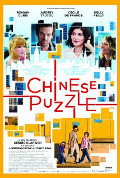
Directed by
Cedric Klapisch
117 minutes
Rated PG
Reviewed by
Sharon Hurst


Chinese Puzzle
Synopsis: Xavier, (Romain Duris) a Parisian writer, is now 40, and separating from Wendy (Kelly Reilly), his wife of 10 years, who announces she is leaving for New York to be with a new lover. Xavier decides he cannot be apart from his kids and follows. In an attempt to gain citizenship he enters into a bogus marriage with a Chinese girl, but to further complicate matters he offers to father a child for his lesbian friend, Isabelle (Cecile de France), and also to host a visit from his ex-girlfriend Martine (Audrey Tatou), with her two kids in tow.
Chinese Puzzle is the third, possibly final and, for me, the best instalment of Cedric Klapisch’s trilogy that began with 2003’s Spanish Apartment and was followed by 2005’s Russian Dolls. If you haven’t seen the precursors, don’t be deterred for it gives you enough background to sketch in what went before.
One of the great delights of this instalment is that much of it is set in New York and the cinematography takes full advantage of a recognisable setting that is energising and daunting for us as well as for Xavier. It is the oft-told story of an immigrant who must live in dodgy digs, take jobs well beneath him, and battle bureaucrats and shonky lawyers in an attempt to gain residence and be near his children. But it is also the story of what it means to grow up and decide what one really wants in life. Xavier finds life extraordinarily complicated, whereas others simply see complications as the reality of most people’s lives. What is required is a strategy to cope.
Appropriately enough, Chinese Puzzle does a good bit of jumping around in time, opening with Xavier racing to his set-up wedding then backtracking a year or so to what got him here. To augment the vibrancy, at times video-clip style shots and semi-animations are used, pinpointing locations on computer-style maps, and with the opening credits, dividing the screen, into a montage of interlocking scenes from all three films. At other times, as Xavier ponders deeper issues, iconic philosophers such as Schopenhauer and Hegel pay him a visit, all of which lends a fresh quirkiness to the film.
There’s a lovely humour to much of the dialogue, and one scene later on in the film cannot resist heading into almost archetypal French farce, it must be noted, to excellent effect. Yet underneath it all some serious issues are hinted at: the role of divorced dads, lesbian parenting, xenophobia, the meaning of love versus lust, and generally what it means to grow up and find or recognise a level of contentment even if that means making compromises.
The main characters are all super-solid in the reprise of their roles. Duris has acquired more gravitas with age and being on screen for most of the film carries it well. His ability to balance lightness with a more sombre tone is impressive. De France, as always, is strong and sexy as the still-womanising Isabelle, while Sandrine Holt is a perfect foil as her more grounded partner and co-mother Ju. Tatou brings a lovely vulnerable edge to Martine, and almost steals the film in one scene where she visits businessmen at a Chinese tea company and floors them with fluent Mandarin. Reilly, with her lovely red hair and British ways, is just as entrancing as before.
Want something different?





